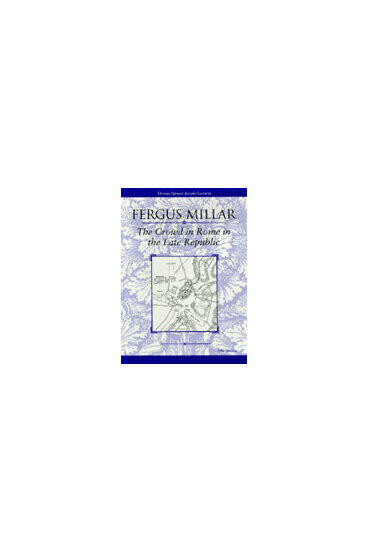The Crowd in Rome in the Late Republic
A major work on the power of the crowd
Description
It has often been thought that Roman politics was dominated by a governing class, or even aristocracy, and it has sometimes been presumed that the Senate was a legislative body. The Crowd in Rome in the Late Republic takes a dramatically new tack, and explores the consequences of a democracy in which public office could be gained only by direct election by the people. And while the Senate could indeed debate public matters, advise other office-holders, and make some administrative decisions, it could not legislate. An office-holder who wanted to pass a law had to step out of the Senate-house and propose it to the people in the Forum--where there were few guarantees.
In this important study, Fergus Millar explores the development of the Roman Republic, which, as it drew to a close in the middle decades of the first century B.C.E., had come to cover most of Italy. There were nearly a million adult male voters in the time of Cicero, but there were no constituencies, and no absentee ballots. To exercise their rights, voters had to come in person to Rome and to meet in the Forum. Millar takes the period from the dictatorship of Sulla to Caesar's crossing of the Rubicon and shows how the politics of the crowd was central to the great changes that took place year after year, and altered the Republic forever.
The originality of Millar's highly accessible work lies first in its serious treatment of the importance of open-air oratory in Roman public life, and second, in its use of the narratives of events that evidence provides. Third, it refuses to interpret these narratives in the light of modern theories about the importance of the client-patron system, or the domination of the Senate. This work questions how we should understand the Roman Republic: as a network of aristocratic families dominating the people, or an erratic and volatile democracy in which power was exercised by the tiny proportion of citizens who actually came to listen to speeches and to vote.
This work speaks to those interested in ancient history and its consequences in the modern world.
Fergus Millar is Camden Professor of Ancient History, Brasenose College, Oxford University.
Fergus Millar is Camden Professor of Ancient History, Brasenose College, Oxford University.
Reviews
". . .. [a] concise and provocative book for Roman historians. . . ."
- Michael C. Alexander, University of Illinois at Chicago
—Michael C. Alexander, University of Illinois at Chicago, American Journal of Philology, Spring 2000
"This book is a polite challenge to a view of Roman Republican politics which prevailed in the late twentieth century. . . . Instead, he argues, Republican Rome was 'a variety of democracy/' His case is memorably presented and will have a lasting influence on debate [sic]."
- Anton Powell, University of Wales
—Anton Powell, University of Wales, Classical Review , Volume 50, No. 2 (2000)
". . . the importance of this book is manifold. Millar has firmly established the importance of openness in the workings of the Roman Republic, insofar as all public business was properly to be conducted in full view of the populous Romanus. The face-to-face nature of the ancient government has rarely been demonstrated more clearly. . . . No future study of the institutions and governance of the Republic, of the workings of Republican politics, or of the Roman ruling class can afford to ignore this book."
- Garrett F. Fagan, Penn State University
—Garrett F. Fagan, Penn State University, Echos du monde classique/Classical Views, Volume XLIII: No. 18, 1999
"This is a challenging work. . . . [I]t can confidently be said that the study of the Late Republic will never be the same again. That is some achievement."
- John Murrell
—John Murrell, JACT Review, Summer 2003
"The lucidity of Millar's survey of the Roman notability's dealing with the populous acting in its 'historic role as audience, witness, an judge of what went on in the name of the Forum' in the years between 81 and 49 B.C. makes it accessible to all interested in Republican politics. . . ."
- A. J. E. Bell, University of Nevada, Las Vegas
—A. J. E. Bell, University of Nevada, Las Vegas, Journal of Roman Studies, Volume 90 (2000)
"Mr. Millar turns traditional interpretations [of Roman government] on their heads, using the corruption of democracy as evidence of its existence. That bribery was widespread demonstrates how essential popular assent was deemed to be for the exercise of political power."
- Paul Lewis, "Historians Give Romans Better Marks In Democracy"
—Paul Lewis, "Historians Give Romans Better Marks In Democracy", New York Times, July 24, 1998
". . . there can be no doubt that Millar has brought a multitude of insights to the study of the late Republic, and there can scarcely be any challenge to his redefinition of the central locus of Roman political activity. It is now clear that the most crucial setting for political decision making at Rome was not the curia but the Forum. . . ."
- Keith Bradley, University of Victoria
—Keith Bradley, University of Victoria, Phoenix, Volume 53 (1999)
"Millar presents us with detailed, interesting and sometimes brilliant analyses of speeches on the restoration of full tribunician powers. . . . It is Millar's interpretation of other speeches—some of them landmarks—and his reflections on the semantics of Republican political oratory and on the genius loci of the most 'hallowed' public space of the Republic that are worth further discussion. The debate on the political culture of Republican Rome must and will continue, and this book should stimulate it considerably."
- Karl-J. Hoelkeskamp, Uniiversitaet zu Koeln
—Karl-J. Hoelkeskamp, Uniiversitaet zu Koeln, Scripta Classica Israelica: Yearbook of the Israel Society for the Promotion of Classical Studies, 2000

